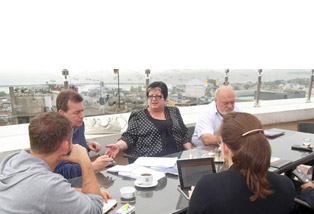Goga Aptsiauri, Regional Media Network
Ruslan Kokoev lives in the Java district. He went to Istanbul to meet his Georgian colleagues in a Georgian-Ossetian civil dialogue which was held for four days. During the dialogue, Georgians and Ossetians spoke very openly and frankly about the problems that hinder the conflict resolution process.
Ruslan has not seen his relatives, who live around Gori, for quite some time. He believes the civil dialogues must continue in order to restore a sense of trust between the two sides; also, roads need to be opened in order to facilitate movement of people, but it will take time for that to happen.
“Any meeting, any contact will definitely support rapprochement. In fact we don’t need rapprochement, we’re close anyway. What happened must be condemned; we must condemn those who did it. My cousin lives in Gori. I haven’t heard from him in quite some time. My godson lives near Tskhinvali, but I haven’t heard from him either. Is that normal?” – Ruslan asks.
“Point of View” is the title of the civil dialogue format, which was created by George Mason University in December 2008. Eleven meetings have taken place since then and the participants in the meetings think that progress has been made with each new meeting. Both Georgian and Ossetian representatives are becoming more and more frank and open. Manana Mebuke is the head of Women’s Peace Movement. She has been participating in these meetings from the very start and believes that meetings like these are a good way of exchanging information and implementing new ideas. According to her, the outlook of the participants regarding conflict resolution is changing for the better.
“The number of participants who can bring correct and relevant information to their regions has increased, which helps in bringing public awareness and changing peoples’ attitude toward the war and the peace process. We’re more open during these meetings, the dialogue is frank, mutual trust has increased” – Manana Mebuke said.
Conflict experts, journalists, representatives of nongovernmental and international organizations also took part in the dialogue. A special feature of the format is the fact that any person who takes part in the dialogue acts as a separate individual rather than a representative of his/her organization. Representatives of Georgian and Ossetian government agencies also take part in the dialogue. Both participants and organizers view the process as a trend of public diplomacy. EIght persons from the Ossetian side and eight persons from the Georgian side took part in the dialogue. The interest in the civil dialogue from international organizations increases from meeting to meeting. Fourteen foreign guests observed this round of meetings. The participants exchanged information on the current situation in de facto South Ossetia and Georgia. Part of the discussion dealt with barriers which hinder solutions to humanitarian problems. Ossetian participants noted that as the new government is being formed, the situation for development of the civil sector in Tskhinvali is improving. According to a member of Women’s Peace Movement, Lira Kozaeva, the participants treat each other with respect in spite of their differences, which shows that the format of the meetings is working. Kozaeva gave an excellent grade to the Istanbul meeting.
“I learned a lot of things about the social and political situation in Georgia and I think Georgians also learnt a lot of things about the developments in South Ossetia. This gives us a great platform for future activities in the areas we work in” – Lira Kozaeva said.
According to conflict expert Paata Zakareishvili, when there is a lack of political dialogue, interest toward public diplomacy increases, but without political dialogue there will be no progress. That is why foreign donors try to sustain the dialogue at least on this level.
“The frame of the dialogue is general and it includes many projects. The main thing for Georgian-Ossetian cooperation is to have a platform where ideas can be generated. Sure, many of them will be rejected, but the ideas that are left are like small gems and will enable us to move forward” – Paata Zakareishvili says.
The first part of the discussion dedicated to the current political situation in Tskhinvali and Tbilisi will soon become public – George Mason University will publish a recording of the discussion on its website. The organizer of the meeting, Georgie Mason University professor Susan Allen Nann says that these meetings enable the participants to listen to each other and receive information on the situation on the other side. This could help improve the life of individuals, tackle problems, and increase trust.
“Signs of progress are evident after three years. I remember there was no public information about our meetings. Now we have a press release. Nobody hides the fact that they’re having these meetings anymore. I’m always wondering because I never know at the start of the meeting what ideas will be voiced, but on the last day there is a creative process between the people and this time we also found a way forward on the third day” – Susan Allan Nann says.
Participants voiced an idea to hold one meeting on the so-called neutral territory near Ergneti village, which would create a new format of civil dialogue in the future. However, political will is also needed to implement this idea as it cannot be realized only through the will of the general public in Georgia and Ossetia.
The Istanbul meeting was held with the financial support from USAID and the US Institute of Peace.




